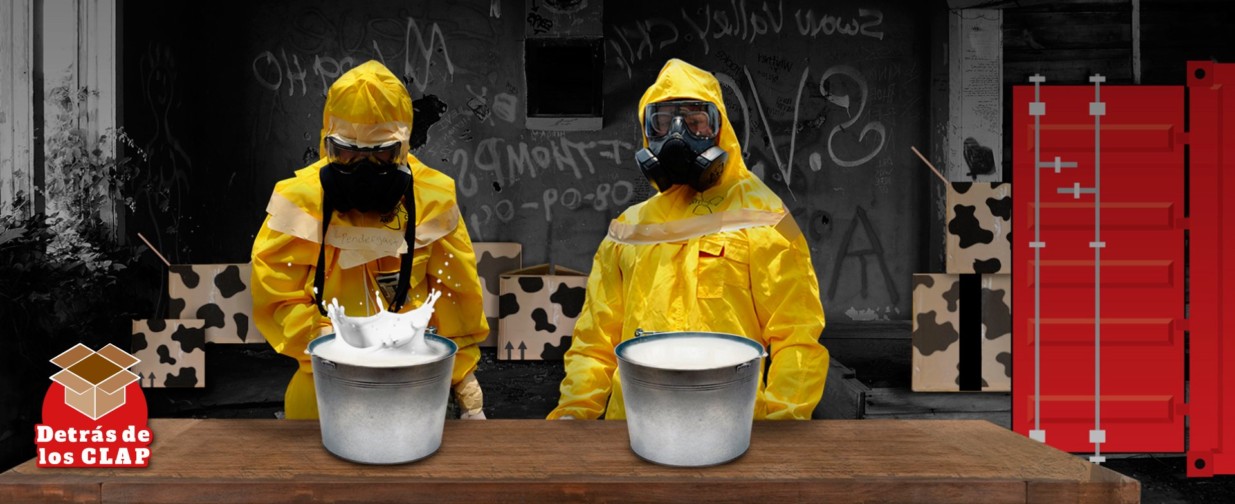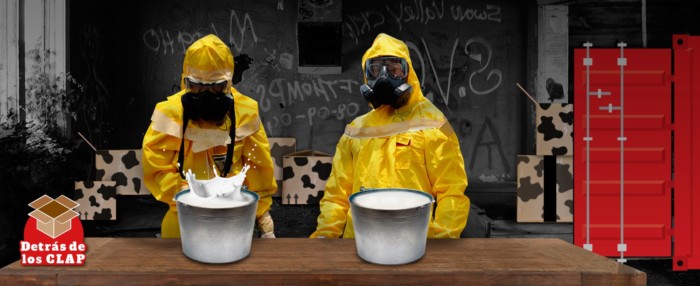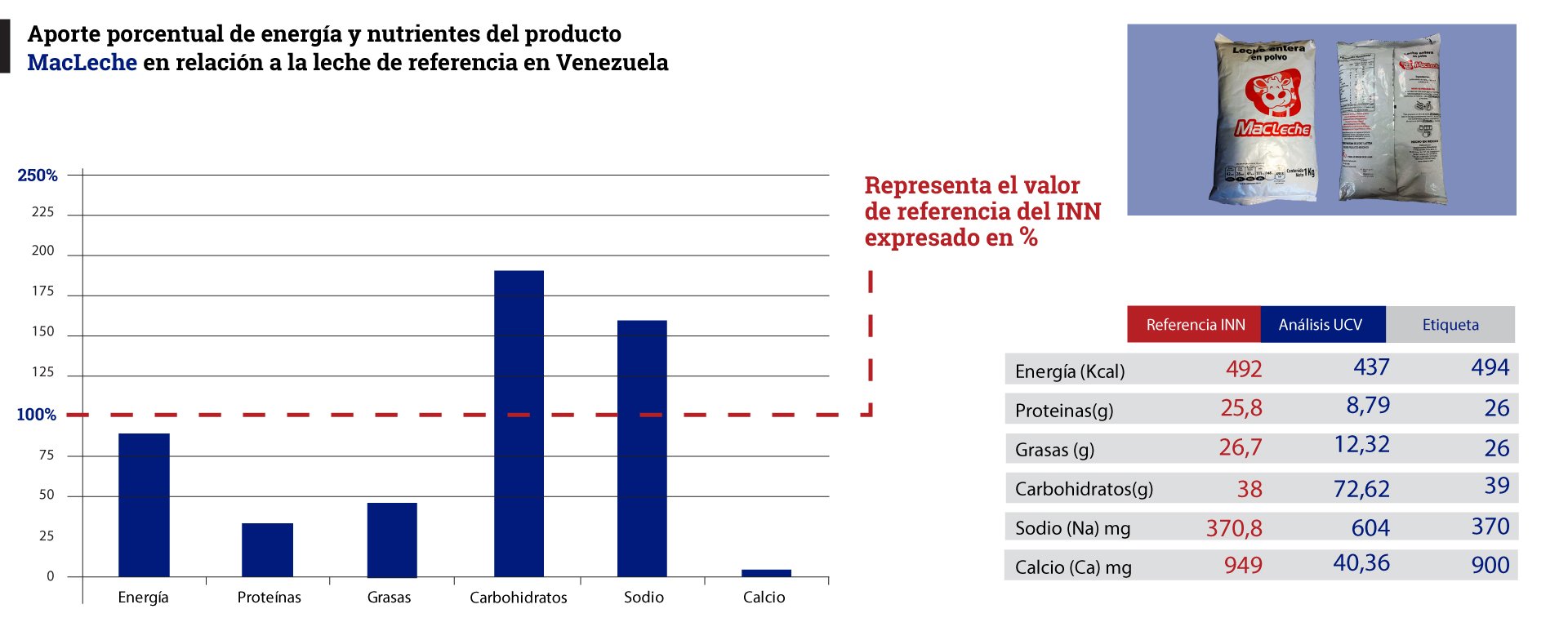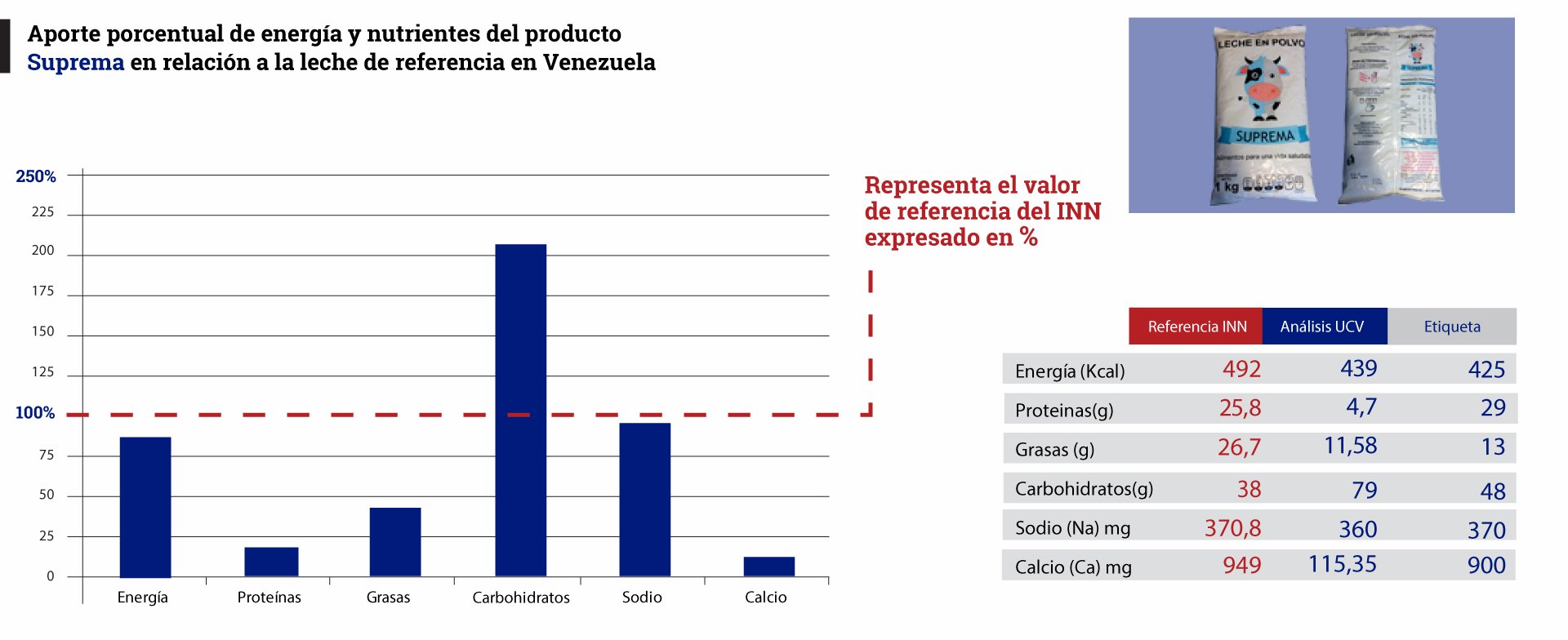

In Mexico, there is a long tradition of cheating in the supply of dairy products packaged for social programs. Hence, it should not be surprising that the Venezuelan corruption had found in that country the perfect formula to include in the so-called CLAP Boxes a paste purchased at auction price as cow's powdered milk. For a mysterious reason, ghostly or barely known companies are the ones monopolizing purchase orders from Venezuela.
|
Getting your Trinity Audio player ready...
|
The verification that the powdered milk included in the so-called "CLAP boxes" is fraudulent, opens questions about the vendors and intermediaries selected by the Venezuelan authorities and the controls that the authorities could apply on the imported product. But that inquiry must not overlook the origin of the merchandise, Mexico. This country registers a dismal tradition of poor quality dairy products intended for its social programs. False information in the nutrition facts label and low supply of nutrients are part of a verifiable pattern both in the CLAP program of Nicolás Maduro Government and in successive initiatives of the Mexican Government.
From as early as 2004, the Consumer Protection Federal Agency (Profeco), one of the federal agencies in Mexico dealing with consumers’ right, have been warning that some brands of milk show problems in commercial information or bear misleading and deceptive legends. In 2006, through the Ministry of Economy, Profeco revealed that 400 brands of dairy products cheated consumers by offering soy or rice drinks as milk. Already in 2008, the agency imposed large fines on more than a hundred brands and banned the sale of four million products.
"Profeco makes verifications every day through the Office of the Assistant Attorney General for Verification - which this laboratory is attached to - and the Verification and Supervision Department. We verify the different points of sale. If there are irregularities concerning the components, a report is made, and based on that, an administrative process takes place in the form of a trial, and if the irregularity is proved, a fine is imposed," explains Engels Ruelas Olvera, General Director of the National Laboratory of Profeco.
In fact, one of the companies that appear as vendors of the Venezuelan CLAP program, Deshidratados Alimenticios e Industriales (DAI), was awarded dozens of contracts from 2012 to 2016 by the Mexican federal government to provide milk to social programs such as "Apadrina a un niño indígena" (Sponsor a indigenous child)," Despensas discapacitados" (Pantries for the Disabled),"Pequeños en movimiento" (Growing children), and "Creciendo sanos" (Healthy Growing), among others.
On May 15, 2017, the Health Ministry of the State of that entity, through the Federal Commission for the Protection Against Sanitary Risks (Cofepris), gave DAI, registered in the state of Nuevo León, a certificate of free sale and export to the Bolivarian Republic of Venezuela.
By that time, massive purchases of food from Mexican companies had skyrocketed thanks to at least two intermediaries from the Venezuelan government, namely, Group Grand Limited, a company linked to Colombian businessman Alex Saab, who Luisa Ortega Díaz, the Public Prosecutor removed from office, directly linked to Nicolás Maduro, or Postar Intertrade Limited, a company registered in Barbados and owned by Venezuelan businessman Samark López, whom the US Treasury Department describes as the "front man" of the Vice President of the Republic, Tareck El Aissami.
DAI
is the producer of the Mac Leche brand, "the one with the red cow", as the
Venezuelan consumers refer to in allusion to its emblem and logo. Among the
eight brand samples analyzed by the Institute of Food Science and Technology of
Universidad Central de Venezuela (UCV) - at the request of Armando.info -,
collected from September to December 2017, that is the one with the worst
nutritional profiles. Although the package affirms that it contains 26 grams
(0.91 oz) of protein per 100 grams (3.52 oz) of product, the chemical analysis
of UCV found that it barely reached 8.79 grams (0.31 oz), a fraction of a
quarter of the reference intake established by the Venezuelan Government through
its regulatory agencies. In the laboratory, Mac Leche had a proportion of sodium
that doubles the quantity indicated on the packaging, which is, by the way, the
maximum allowed by national and international milk standards. This
characteristic produces the salty taste that consumers often complain about in
social media and that is already part of the image
- probably undesired - of
the brand.

These distortions alone already violate two Mexican standards, NOM-155-SCFI-2012 that establishes among the nutritional properties of milk a minimum of 34 grams (1.19 oz) of proteins per liter, and NOM-051-SCFI/SSA1-2010 establishing that the label information "must be true and be described and presented in such a way as not to mislead the consumer regarding the nature and characteristics of the product."
However, business opportunities in Venezuela are so attractive that DAI, in addition to its retail participation in the CLAP combos with the Mac Leche brand, appears delivering from October to November 2017 shipments of around 2,100 tons of powdered milk for the Venezuelan state corporation Sole Corporation of Productive and Food Services (Cuspal), attached to the Ministry of Food, based on the records of Puerto Cabello, Carabobo state, the country's main port. The Mac Leche brand was so broadly recognized among low purchasing power consumers, beneficiaries of the welfare programs of the Government of Nicolás Maduro, that during some months of 2017, DAI had to coexist with another brand of milk, a “me too” that openly tried to imitate the colors, name and visual identity of Mac Leche.
DAI’s legal representative Jaime H. García was contacted, but by the time this report was closed, he had not clarified the disparity between the information reported on the labels by the company and the UCV analysis, nor the case of the counterfeit of the product. Neither did the Cofepris Mexican authorities offer their version about the irregularities.
The singularity of the DAI - Mac Leche case is that it is a company and a brand that operate both in the Mexican and Venezuelan markets openly and simultaneously. Most CLAP dairy substitutes are produced by companies with unknown histories and through brands like Lacto Más and Suprema, which are not even sold in the supermarket networks of Mexico and are exclusively produced for Venezuela.
Both Lacto Más and Suprema are packaged by Grupo Brandon, an unknown company in the Mexican food industry. Anyone who follows the address reflected in the packaging of both brands will arrive at a house in Colonia del Valle, San Pedro, Garza García, in Nuevo León. But there operates another company, the representatives of which say they have nothing to do with milk production or processing. The chemical analysis of UCV made to the Supreme brand milk reveals that this product barely contains 4.7 grams (0.16 oz) of protein per 100 grams (3.52 oz) instead of the 29 grams (1.02 oz) reflected on the label, and only 115.33 milligrams (0.0040 oz) of calcium, well below the 900 milligrams (0.0031 oz) that it offers. An inscription on the packaging reads, "To be distributed in the Bolivarian Republic of Venezuela.” Despite this, the CLAP business for Grupo Brandon seems to be booming. Recently, the Santa Paula brand arrived in Venezuela, also packed by the company.

Something similar to Grupo Brandon occurs with Dilac, responsible for the production of KF Milk and Pure Milk, both also analyzed by UCV. Both brands prefer to identify themselves as "fortified dairy products" instead of as milk. But this barely perceptible transparency ends there. At the alleged offices of the company, they said they did not know those brands. It is a dairy company, but it does not export products to the Mexican market.
Since the beginning of the CLAPs, no Venezuelan official has explained why these barely known Mexican companies or the intermediaries that have ended up buying that merchandise were chosen.
For some months now, parliament members of different opposition political parties have been offering to make informal proceedings on request before agencies like the Colombian Attorney General's Office and the United States Department of the Treasury. They issue letters of good conduct to those responsible for negotiations on the imports for CLAP combos, so that such agencies absolve or stop investigating entrepreneurs like Carlos Lizcano, a subordinate of the already sanctioned Alex Saab and Alvaro Pulido. The fact that the most active defense of the main social program and focus of corruption of the government of Nicolas Maduro comes from the heart of the National Assembly 'in contempt' is just one of the ironies of this story.
The former chavista governor of the State of Bolívar from 2004 to 2017 changed overnight from excessive media exhibitionism to low profile. His departure to Mexico completed the circle of the retirement plan he had been preparing while on civil service. He was now staying in the same country where the businesses of his daughter's husband flourished, which he had significantly fostered from his positions in Guayana. Now, with financial sanctions imposed on him by Canada and the United States, Francisco José Rangel Gómez prefers to stay under the radar.
Six out of every ten Venezuelan sex workers killed abroad since 2012 were in Mexico. In that country it is often about attractive girls who work as high-level company ladies or night-time waiters, businesses directly managed by organized crime. There are many clues that lead to the Guadalajara New Generation Cartel at the peak of this trade in people, with the complicity of others such as Los Cuinis and Tepito. Often the human merchandise becomes the property of capos and assassins, with whom he knows the hell of the femicides
Adrián Perdomo Mata has just entered the list of sanctioned entities of the US Department of the Treasury, as president of Minerven, the state company in charge of exploring, exporting and processing precious metals, particularly gold from the Guayana mines. His arrival in office coincided with the boom in exports of Venezuelan gold to new destinations, like Turkey, to finance food imports. Behind these secretive operations is the shadow of Alex Saab and Álvaro Pulido, the main beneficiaries of the sales of food for the Local Supply and Production Committee (Clap). Perdomo worked with them before Nicolás Maduro placed him in charge of the Venezuelan gold.
A study by Mexican authorities confirms what the palate of the Venezuelans quickly detected: There is something odd in the Mexican canned tuna that comes in the combos of the Local Supply and Production Committee (CLAP). At least three of the brands that the poorest homes have consumed in the country since March 2016, when the state plan was formalized, have high proportions of soy, a vegetable protein that although not harmful, it does not have the same taste and protein contribution of tuna. Behind the addition of soy there is an operation to reduce costs where all the intermediaries, handpicked by the Venezuelan Government to buy the goods, have participated.
Gassan Salama, a Palestinian-cause activist, born in Colombia and naturalized Panamanian, frequently posts messages supporting the Cuban and Bolivarian revolutions on his social media accounts. But that leaning is not the main sign to doubt his impartiality as an observer of the elections in Venezuela, a role he played in the contested elections whereby Nicolás Maduro ratified himself as president. In fact, Salama, an entrepreneur and politician who has carried out controversial searches for submarine wrecks in Caribbean waters, found his true treasure in the main social aid and control program of Chavismo, the Clap, for which he receives millions of euros.
When Vice President Delcy Rodríguez turned to a group of Mexican friends and partners to lessen the new electricity emergency in Venezuela, she laid the foundation stone of a shortcut through which Chavismo and its commercial allies have dodged the sanctions imposed by Washington on PDVSA’s exports of crude oil. Since then, with Alex Saab, Joaquín Leal and Alessandro Bazzoni as key figures, the circuit has spread to some thirty countries to trade other Venezuelan commodities. This is part of the revelations of this joint investigative series between the newspaper El País and Armando.info, developed from a leak of thousands of documents.
Leaked documents on Libre Abordo and the rest of the shady network that Joaquín Leal managed from Mexico, with tentacles reaching 30 countries, ―aimed to trade PDVSA crude oil and other raw materials that the Caracas regime needed to place in international markets in spite of the sanctions― show that the businessman claimed to have the approval of the Mexican government and supplies from Segalmex, an official entity. Beyond this smoking gun, there is evidence that Leal had privileged access to the vice foreign minister for Latin America and the Caribbean, Maximiliano Reyes.
The business structure that Alex Saab had registered in Turkey—revealed in 2018 in an article by Armando.info—was merely a false start for his plans to export Venezuelan coal. Almost simultaneously, the Colombian merchant made contact with his Mexican counterpart, Joaquín Leal, to plot a network that would not only market crude oil from Venezuelan state oil company PDVSA, as part of a maneuver to bypass the sanctions imposed by Washington, but would also take charge of a scheme to export coal from the mines of Zulia, in western Venezuela. The dirty play allowed that thousands of tons, valued in millions of dollars, ended up in ports in Mexico and Central America.
As part of their business network based in Mexico, with one foot in Dubai, the two traders devised a way to replace the operation of the large international credit card franchises if they were to abandon the Venezuelan market because of Washington’s sanctions. The developed electronic payment system, “Paquete Alcance,” aimed to get hundreds of millions of dollars in remittances sent by expatriates and use them to finance purchases at CLAP stores.
Scions of different lineages of tycoons in Venezuela, Francisco D’Agostino and Eduardo Cisneros are non-blood relatives. They were also partners for a short time in Elemento Oil & Gas Ltd, a Malta-based company, over which the young Cisneros eventually took full ownership. Elemento was a protagonist in the secret network of Venezuelan crude oil marketing that Joaquín Leal activated from Mexico. However, when it came to imposing sanctions, Washington penalized D’Agostino only… Why?
Through a company registered in Mexico – Consorcio Panamericano de Exportación – with no known trajectory or experience, Joaquín Leal made a daring proposal to the Venezuelan Guyana Corporation to “reactivate” the aluminum industry, paralyzed after March 2019 blackout. The business proposed to pay the power supply of state-owned companies in exchange for payment-in-kind with the metal.